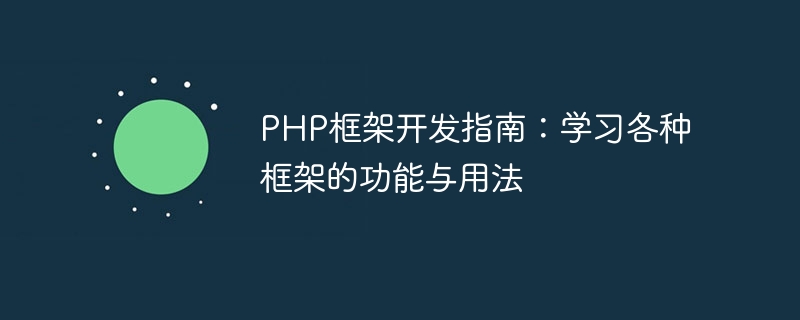

PHP Framework Development Guide: Learn the functions and usage of various frameworks
Introduction:
As a popular development language, PHP has many excellent frameworks Available to choose from. An excellent PHP framework can provide an efficient development environment and flexible functions, greatly simplifying the development process. This article will introduce several common PHP frameworks, including Symfony, Laravel and CodeIgniter, and explore their functions and usage.
1. Symfony
Symfony is a stable and feature-rich PHP framework that is widely used in large and complex projects. It follows the MVC (Model-View-Controller) architecture and provides powerful routing, template engine, form processing and database abstraction functions. Symfony also supports many common development tasks such as cache management, authentication, and internationalization.
The use of Symfony is relatively complicated and requires a certain learning cost. But once the basic concepts and core functionality are mastered, developers can efficiently build robust applications. Symfony's documentation is very complete and the community is active, making it easy to get answers and help.
2. Laravel
Laravel is a simple and elegant PHP framework that has received widespread attention for its ease of use and rich functions. Laravel provides a powerful routing system, ORM (Object Relational Mapping) tools, template engine, built-in authentication system, etc. In addition, Laravel also provides many other commonly used functions, such as cache control, task scheduling, and event handling.
Laravel has very friendly documentation and community. Its learning curve is relatively gentle, and beginners can get started quickly. Laravel also has a rich extension ecosystem, making it easy to integrate third-party packages and plugins through Composer.
3. CodeIgniter
CodeIgniter is a lightweight PHP framework suitable for rapid development of small projects. It provides a simple and intuitive API that is easy to learn and use. CodeIgniter's core functions include routing, database abstraction, form validation and file upload. Although CodeIgniter has relatively few features, it is enough for some simple projects.
CodeIgniter focuses on performance and efficiency, runs quickly, and is suitable for some projects that have higher requirements on response time. Its documentation is relatively comprehensive and the community is relatively active, making it easy to get support and help.
4. Summary
Whether it is Symfony, Laravel or CodeIgniter, they are all widely used frameworks in the field of PHP development. Each framework has its own characteristics and advantages, and developers can choose the appropriate framework according to the needs of the project. Learning and mastering the functions and usage of multiple frameworks can help developers handle various development tasks more flexibly.
In order to learn various PHP frameworks, developers can refer to official documents, read books or tutorials, and participate in discussions and exchanges in relevant communities. In addition, practice is the best way to learn. Developers can use some sample projects for practical operations to deepen their understanding and mastery of the framework.
Finally, no matter which framework you choose, it is recommended that developers maintain code quality and focus on performance optimization and security as their first principles. Through continuous learning and practice, developers will continue to improve their development skills and build high-quality PHP applications.
The above is the detailed content of PHP Framework Development Guide: Learn the functions and usage of various frameworks. For more information, please follow other related articles on the PHP Chinese website!